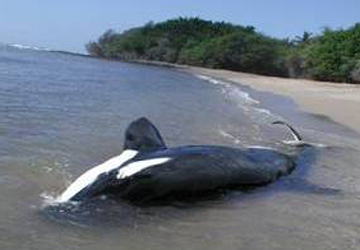Almost 2400 years ago, the Greek philosopher Aristotle noted that whales sometimes did something odd: They ran aground without, he noted, any apparent reason.
 A stranded killer whale. Credit: National Oceanic and Atmospheric Administration.
A stranded killer whale. Credit: National Oceanic and Atmospheric Administration.Whales still run aground -- thousands of them “strand” themselves every year, sometimes in groups of dozens or even hundreds. And scientists are still trying to fully understand the reasons.
One thing all the explanations have in common is disorientation. Whales use “echolocation” to navigate -- they send out pulses of sound and detect their reflection off prey, the sea floor, and other objects. But sometimes that navigation system gets scrambled -- in essence, the whales aren’t seeing straight. And there appear to be several possible causes.
One is stormy weather, which can push the whales closer to shore. If the whales are close to a gently sloping shoreline, their internal sonar may not be able to detect it. That means the giant mammals could run into the beach without ever seeing it.
Disturbances in Earth’s magnetic field may also confuse the whales. The disturbances could be caused by magnetic storms on the Sun, or by motions on the ocean floor in areas where earthquakes are imminent.
And at least some strandings appear to be caused by people -- particularly the powerful sounds of military sonar. The sonar may disorient whales that feed at great depths, where the sound can be especially intense. The confused whales surface quickly and run aground -- one of several possible reasons for these seemingly random acts of self-destruction.

